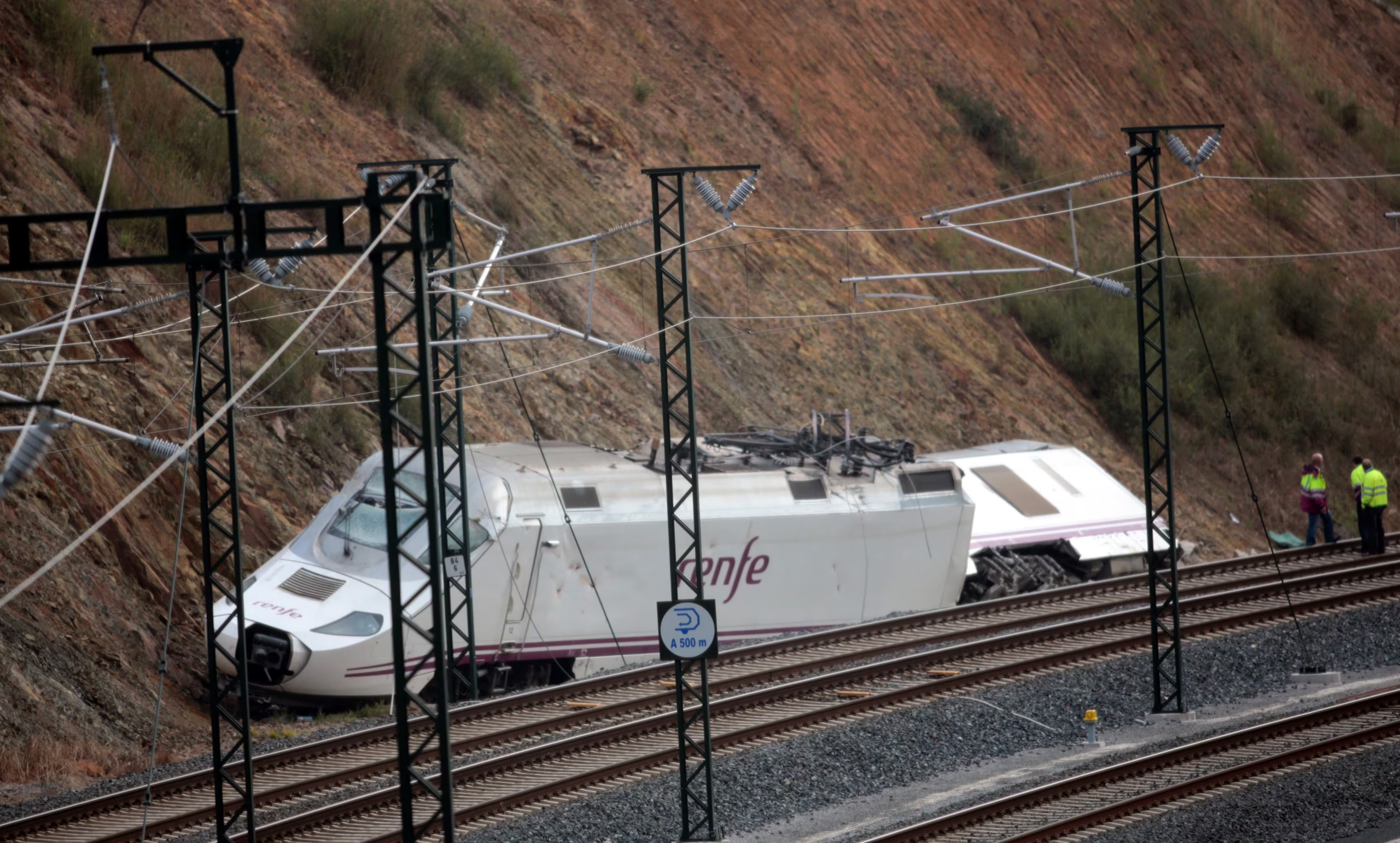World News
Trump Tariffs Declared Illegal by Appeals Court but Will Supreme Court Save Him?
A federal court strikes down Donald Trump’s sweeping trade tariffs, setting the stage for a high-stakes Supreme Court battle.

The aggressive trade policy of Donald Trump suffered a dramatic blow on Friday after a federal appeals court ruled that most of his global tariffs were unconstitutional. In a 7-4 decision, the U.S. Court of Appeals for the Federal Circuit held that the law Trump relied on — the International Emergency Economic Powers Act (IEEPA) — does not grant the president unlimited power to impose tariffs.

“The core Congressional power to impose taxes such as tariffs is vested exclusively in the legislative branch,” the court emphasized. In other words, tariffs are not a presidential weapon, but a constitutional power held by Congress.
Trump’s Furious Response
As expected, Trump lashed out on Truth Social, branding the court “highly partisan” and predicting the Supreme Court would side with him.
“If these tariffs ever went away, it would be a total disaster for the Country,” Trump wrote. “If allowed to stand, this Decision would literally destroy the United States of America.”
The White House, however, struck a more measured tone. Spokesman Kush Desai said the tariffs “remain in effect” until the matter reaches the Supreme Court, and added that the administration is “confident of ultimate victory.”
Table of Contents
The Legal Battle So Far
Friday’s ruling marks Trump’s second consecutive loss in the make-or-break case V.O.S. Selections v. Trump. The lawsuit, a consolidation of challenges from multiple states and small businesses, argued that Trump’s “Liberation Day” tariffs were unlawful under IEEPA.
Back in May, the U.S. Court of International Trade had already rejected Trump’s stance and struck down tariffs imposed on Canada, Mexico and China, which were justified by the administration as necessary to combat fentanyl trafficking. The latest appeals court ruling echoed that skepticism, noting that the tariffs were “unbounded in scope, amount, and duration.”
Voices From the Courtroom
“This decision protects American businesses and consumers from the uncertainty and harm caused by unlawful tariffs,” said attorney Jeffrey Schwab of the Liberty Justice Center, which represented small-business plaintiffs.
Co-counsel Neal Katyal praised the judgment as a “powerful reaffirmation” of constitutional checks and balances, stressing that presidents must act within the rule of law.
Still, not all judges agreed. Four dissenting justices argued the plaintiffs had not justified their request for summary judgment, leaving the door open for further debate in the nation’s highest court.

Economic and Political Stakes
The stakes are enormous. Trump’s tariffs have been a signature feature of his economic nationalism, reshaping trade relations with allies and adversaries alike. According to the Congressional Budget Office, tariffs could reduce U.S. deficits by $4 trillion over the next decade.
Commerce Secretary Howard Lutnick warned that striking them down “would cause massive and irreparable harm,” undermining foreign policy, inviting retaliation from trading partners, and threatening ongoing negotiations.

What Happens Next?
For now, the appeals court has paused its decision until October 14, allowing the Trump administration time to petition the Supreme Court. If the justices agree to hear the case, it will set the stage for one of the most consequential legal battles over presidential authority in decades.
Whether Trump emerges as a defender of American industry or sees his trade legacy dismantled will depend not on fiery speeches or viral Truth Social posts, but on the nine justices in Washington, D.C.
As one trade analyst summed it up on X: “This is not just about tariffs — it’s about the limits of presidential power.”
For more Update http://www.dailyglobaldiary.com
World News
Spain’s Deadliest Train Disasters What Happened and What Changed
From historic crashes to terror attacks, Spain’s rail network has witnessed some of the worst disasters in European history

Spain is reeling after another devastating rail tragedy. At least 39 people were killed and more than 120 injured when a high-speed train derailed and collided with an oncoming train near Adamuz in southern Spain, marking the country’s worst railway accident in over a decade. As investigations begin, the incident has reopened painful memories of past disasters that left deep scars on the nation.
Here is a look at some of Spain’s deadliest train disasters over the past century.
Santiago de Compostela train crash (2013)
Spain’s most lethal rail accident in recent memory occurred near Santiago de Compostela in July 2013. A high-speed train derailed on a sharp curve, smashing into a concrete wall and catching fire.
The tragedy claimed 80 lives and injured 145 people. An official investigation found that excessive speed and driver distraction played a key role, though victims’ groups argued that inadequate safety systems also contributed.
Madrid commuter train bombings (2004)
On March 11, 2004, Spain witnessed one of the deadliest terrorist attacks in Europe. Ten backpack bombs exploded on four commuter trains during rush hour in Madrid.
The coordinated attacks killed 193 people and injured thousands. The bombings, carried out by Islamist extremists, were linked to Spain’s involvement in the Iraq war and fundamentally changed the country’s security landscape.
El Cuervo train collision (1972)
In 1972, a head-on collision on the Cadiz–Seville route near El Cuervo resulted in 86 deaths and more than 150 injuries.
Investigators concluded that the crash occurred after a driver failed to stop at a red signal, highlighting the dangers of human error in rail operations.
Urduliz rail accident (1970)
A fatal collision between two trains in Urduliz, near Bilbao, killed 33 people in the summer of 1970.
Initially, a stationmaster was blamed, but later findings revealed he had been working exhausting 16-hour shifts for several consecutive days, raising serious concerns about working conditions and fatigue.

Grisen train fire (1965)
In 1965, a passenger train on the Madrid–Barcelona line caught fire near Grisen.
Officials at the time reported 30 deaths, but later accounts suggested the toll may have been as high as 80. Under the Franco regime, details of the disaster were allegedly suppressed, leaving lingering uncertainty about the true scale of the tragedy.
Torre del Bierzo rail disaster (1944)
One of Spain’s deadliest and most controversial rail disasters occurred in 1944 in Torre del Bierzo.
A train travelling from Madrid to A Coruña suffered brake failure and collided with a locomotive inside a tunnel. Moments later, a third train crashed into the wreckage. Official figures cited 78 deaths, but censorship under dictator Francisco Franco has led historians to believe the actual toll may have been much higher.
A nation forced to remember
Each new rail disaster in Spain revives memories of these tragedies, underscoring the high cost of safety failures, human error, and, at times, political secrecy. As authorities investigate the latest crash near Adamuz, the hope is that lessons from the past will prevent history from repeating itself yet again.
World News
A Stunning Turn in the Harvey Weinstein Case as Defense Points to Juror Pressure Claims
As Harvey Weinstein awaits sentencing in New York, his legal team points to alleged juror intimidation, asking the court for a rare hearing that could reshape the future of the high-profile case.

The legal battle surrounding disgraced Hollywood producer Harvey Weinstein has taken another dramatic turn. His defense team is now pushing hard to undo his latest New York conviction, citing claims that a juror was pressured and bullied into delivering a guilty verdict — a move that could potentially reopen one of the most closely watched trials in modern American legal history.
In June, a 12-member jury in Manhattan convicted Weinstein on one count of a criminal sexual act in the first degree involving former Project Runway assistant Miriam Haley. The jury, however, acquitted him on a separate charge involving former model Kaja Sokola, and failed to reach a verdict on a third count of rape connected to aspiring actress Jessica Mann, leading to a mistrial on that charge.
A Juror’s Claim Sparks New Legal Strategy
Weinstein’s attorney, Arthur Aidala, says the verdict may have been compromised. According to Aidala, a juror approached his legal team moments after the verdict, alleging they were intimidated by fellow jurors and effectively coerced into voting guilty on the Haley charge.
“These are not small claims,” Aidala said in remarks to The Hollywood Reporter. “At the very least, we are asking the court to hold a hearing and hear this juror out.”
ALSO READ : “She Never Made It Out…” Albany House Fire Claims Woman’s Life as Family Pleads for Help to Bring Her Home
The defense formally moved to vacate the conviction in October, backing the request with sworn affidavits from two jurors. The motion argues that internal jury pressure crossed a legal line — a rare and difficult standard to prove, but one that can be explosive if accepted by the court.
Prosecutors Push Back Hard
Prosecutors have strongly opposed the request. In a November filing, they argued that juror testimony about internal deliberations cannot legally be used to overturn a verdict unless it involves extremely narrow exceptions, such as racial bias or improper outside influence — neither of which, they say, applies here.

“Juror testimony cannot, as a matter of law, be used to impeach a guilty verdict,” prosecutors wrote, emphasizing that tension, disagreement, or heated debate inside the jury room does not constitute misconduct under New York law.
They also stressed that the trial judge, Curtis Farber, addressed concerns promptly and thoroughly whenever they arose during the proceedings.
Earlier Jury Tensions Revisited
During the trial, the jury foreperson approached Judge Farber on two occasions. One concern involved jurors allegedly referencing Weinstein’s past conduct that was not entered into evidence. Another juror later said he overheard discussions about a fellow juror in courthouse elevators and questioned whether the deliberations were fair.
Judge Farber questioned the jurors both in open court and privately in chambers before determining there was no misconduct serious enough to halt the trial. Notably, the juror now cited in Aidala’s motion was not among those previously questioned.
What Happens Next
A hearing on the motion to vacate had been scheduled for this week but was postponed until early January due to unrelated court matters. At that hearing, Judge Farber could dismiss the motion outright, order a limited hearing with the juror, or move forward with preparations for a new rape trial related to Jessica Mann.
Meanwhile, Weinstein has yet to be sentenced on the June conviction. Since April 2024, he has been held at Rikers Island, following the overturning of his 2020 New York conviction. He has also spent time at Bellevue Hospital during the proceedings, as his legal team continues to cite serious health concerns.
According to Aidala, Weinstein is now “on the verge” of entering his seventh year behind bars when accounting for time already served — a grim milestone for the once-powerful studio executive whose downfall helped ignite the global #MeToo movement.
Whether these new juror intimidation claims gain legal traction or quietly fade away, they underscore one reality: even years after his initial conviction, Harvey Weinstein’s courtroom saga is far from over.
World News
Harvey Weinstein’s Lawyers Drop New Bombshell Claim as Juror Pressure Allegations Surface… Could Conviction Be Overturned?
As Harvey Weinstein awaits sentencing in New York, his legal team points to alleged juror intimidation, asking the court for a rare hearing that could reshape the future of the high-profile case.

The legal battle surrounding disgraced Hollywood producer Harvey Weinstein has taken another dramatic turn. His defense team is now pushing hard to undo his latest New York conviction, citing claims that a juror was pressured and bullied into delivering a guilty verdict — a move that could potentially reopen one of the most closely watched trials in modern American legal history.
In June, a 12-member jury in Manhattan convicted Weinstein on one count of a criminal sexual act in the first degree involving former Project Runway assistant Miriam Haley. The jury, however, acquitted him on a separate charge involving former model Kaja Sokola, and failed to reach a verdict on a third count of rape connected to aspiring actress Jessica Mann, leading to a mistrial on that charge.
A Juror’s Claim Sparks New Legal Strategy
Weinstein’s attorney, Arthur Aidala, says the verdict may have been compromised. According to Aidala, a juror approached his legal team moments after the verdict, alleging they were intimidated by fellow jurors and effectively coerced into voting guilty on the Haley charge.
“These are not small claims,” Aidala said in remarks to The Hollywood Reporter. “At the very least, we are asking the court to hold a hearing and hear this juror out.”
ALSO READ : “She Never Made It Out…” Albany House Fire Claims Woman’s Life as Family Pleads for Help to Bring Her Home
The defense formally moved to vacate the conviction in October, backing the request with sworn affidavits from two jurors. The motion argues that internal jury pressure crossed a legal line — a rare and difficult standard to prove, but one that can be explosive if accepted by the court.
Prosecutors Push Back Hard
Prosecutors have strongly opposed the request. In a November filing, they argued that juror testimony about internal deliberations cannot legally be used to overturn a verdict unless it involves extremely narrow exceptions, such as racial bias or improper outside influence — neither of which, they say, applies here.

“Juror testimony cannot, as a matter of law, be used to impeach a guilty verdict,” prosecutors wrote, emphasizing that tension, disagreement, or heated debate inside the jury room does not constitute misconduct under New York law.
They also stressed that the trial judge, Curtis Farber, addressed concerns promptly and thoroughly whenever they arose during the proceedings.
Earlier Jury Tensions Revisited
During the trial, the jury foreperson approached Judge Farber on two occasions. One concern involved jurors allegedly referencing Weinstein’s past conduct that was not entered into evidence. Another juror later said he overheard discussions about a fellow juror in courthouse elevators and questioned whether the deliberations were fair.
Judge Farber questioned the jurors both in open court and privately in chambers before determining there was no misconduct serious enough to halt the trial. Notably, the juror now cited in Aidala’s motion was not among those previously questioned.
What Happens Next
A hearing on the motion to vacate had been scheduled for this week but was postponed until early January due to unrelated court matters. At that hearing, Judge Farber could dismiss the motion outright, order a limited hearing with the juror, or move forward with preparations for a new rape trial related to Jessica Mann.
Meanwhile, Weinstein has yet to be sentenced on the June conviction. Since April 2024, he has been held at Rikers Island, following the overturning of his 2020 New York conviction. He has also spent time at Bellevue Hospital during the proceedings, as his legal team continues to cite serious health concerns.
According to Aidala, Weinstein is now “on the verge” of entering his seventh year behind bars when accounting for time already served — a grim milestone for the once-powerful studio executive whose downfall helped ignite the global #MeToo movement.
Whether these new juror intimidation claims gain legal traction or quietly fade away, they underscore one reality: even years after his initial conviction, Harvey Weinstein’s courtroom saga is far from over.
-

 Entertainment5 days ago
Entertainment5 days agoHe-Man Wears a Suit Now… Nicholas Galitzine’s ‘Masters of the Universe’ Trailer Drops a Shock Fans Didn’t See Coming
-

 Entertainment1 week ago
Entertainment1 week agoBrazil Eyes Oscar History Again… ‘The Secret Agent’ Scores Best Picture Nomination as Wagner Moura Stuns Hollywood
-

 Entertainment3 days ago
Entertainment3 days ago“Comedy Needs Courage Again…”: Judd Apatow Opens Up on Mel Brooks, Talking to Rob Reiner, and Why Studio Laughs Have Vanished
-

 Entertainment1 week ago
Entertainment1 week agoBox Office Shocker as Chris Pratt’s ‘Mercy’ Knocks ‘Avatar 3’ Off the Top but Nature Had Other Plans…
-

 Entertainment5 days ago
Entertainment5 days agoOscars Go Global in a Big Way as This Year’s Nominations Signal a New Era: ‘The Academy Is Finally Looking Beyond Hollywood…’
-

 Entertainment1 week ago
Entertainment1 week agoMichael Bay Makes a Power Move… Blockbuster Director Signs with CAA in a Deal That’s Turning Heads
-

 Entertainment5 days ago
Entertainment5 days ago“Dangerously Kinky… and Darkly Funny”: Olivia Wilde and Cooper Hoffman Push Boundaries in ‘I Want Your Sex’
-

 Entertainment1 week ago
Entertainment1 week agoFans Didn’t Expect This Look… Nicholas Galitzine’s Masters of the Universe Trailer Sparks Debate





















